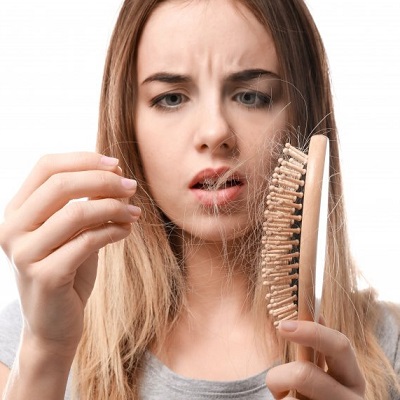
Alopecia, or hair loss, can happen all over your body or just on your head. It can also be brief or last a long time. Moreover, changing hormones, genetics, health problems, or just getting older can all cause it. Furthermore, head hair loss can happen to anyone. Additionally, when someone is bald, they usually lose a lot of hair from their head.
Further, the most common reason people go bald is genetic hair loss that gets worse with age. Additionally, to understand what the signs of hair loss are in women, you need to talk to your doctor. Additionally, millions of women around the world worry about losing their hair. However, it is normal to lose a little hair every day. But losing a lot of hair can be upsetting and could be a sign of a deeper problem. In this blog, we will talk about the reasons, symptoms, and solutions for hair loss in women.
Understanding Hair Loss in Women:
Female pattern baldness, also called androgenetic alopecia, is the loss of hair that happens to some women. Moreover, hormonal changes, genetics, stress, food, and medical conditions can cause hair loss in women. In contrast to men, women usually only lose a few hairs at a time instead of going completely bald.
What Are the Signs of Hair Loss in Women?
- Increased Shedding: Hair falling out in the shower, on pillows, or when you brush your teeth.
- Hair Loss: Hair loss that happens over time all over the head, mostly at the crown or part line.
- Widening of the Hair Part: The part line is getting wider because the hair is getting thinner.
- Receding Hairline: The hairline moves back, making the face stand out more.
- Bald Patches: These are small, round spots of baldness on the head. They are a less common sign, but they can happen.
- Thinner Volume: Having less hair volume means that your hair looks thinner and less full.
Causes of Women’s Hair Loss:
After understanding What the Signs of Hair Loss in Women Are, it is important to know the causes so they can get proper treatment. Therefore, the following are some causes.
- Transitions in Hormones: Changes in hormones, like those that happen during pregnancy, childbirth, or menopause, can cause hair loss.
- Genetics: A woman’s family background is a big part of how likely she is to get female pattern baldness.
- Stress: Emotional or physical stress can mess up the hair growth cycle and cause short-term hair loss.
- Nutrient Deficiency: Not getting enough of certain nutrients, like iron, vitamins, and fats, can hurt the health of your hair.
- Medical Conditions: Thyroid problems, autoimmune diseases, and infections on the head are some of the medical conditions that can cause hair loss.
Different Ways to Treat Women’s Hair Loss
There are different ways to treat women who are losing their hair based on what is causing it and how bad it is. Hormone changes can lead to hair loss. To stop further hair loss, doctors may recommend oral contraceptives or anti-androgen drugs to balance hormone levels. For women who have alopecia areata or telogen effluvium, corticosteroid shots or oral medicines like minoxidil may help hair grow back.
Platelet-rich plasma (PRP) treatment, microneedling, and low-level laser therapy are some other popular non-invasive ways to stimulate hair cells and make hair grow. Also, changing things about your lifestyle, like worry, bad diet, and some hairstyles, can help your hair stay healthy and stop it from falling out even more. Women who are losing their hair should see a doctor or trichologist to figure out the best way to treat their condition based on their specific needs and situation.
Getting Advice from an Expert:
If you think you might be losing your hair, you should see a dermatologist. It is important to get a good evaluation and a personalized treatment plan. Consult with Dynamic Clinic Pk to get expert advice. Moreover, these professionals can look at your skin and medical background. Furthermore, it is also essential to figure out why you are losing your hair and suggest the best way to stop it.
Final Thoughts
Figuring out how to deal with this common problem starts with being able to spot the signs of hair loss in women. Women who know the signs and possible reasons for hair loss can take steps to keep their hair healthy and get help as soon as they need it.



